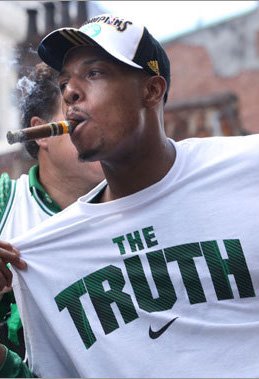Sure, Dwight Howard is a beast down low and ranks as one of the best centers in the game, but his dominance comes from his physicality, athleticism and rebounding ability, not because of his ability to score in the post. In basketball, there's a difference between scoring close to the basket and scoring out of the post. Though both events usually occur in the same general area on the floor, they are not the same. To score in the low post requires strength, athleticism and physicality to be sure, however it also requires several things that Dwight Howard sorely lacks: soft hands, good footwork and a light touch with both hands around the rim.
Soft hands are necessary not just for converting baby hooks, floaters, turn around jumpers and bank shots, but for dribbling the basketball in traffic, catching an entry pass and passing out of a double team as well. Similarly, good footwork is an absolute must for successful low post offense, as the offensive player must efficiently and effectively use their feet to win a position battle and get to their spots on the floor from more than just a few feet away. Lastly, a light shooting touch with both hands is necessary for elite post play, as the league's best defenders can force an opponent to go to their off hand in the post as an effective means for getting a stop.
Tim Duncan, Yao Ming, Pau Gasol and Al Jefferson can do all of these things, Dwight Howard cannot. First of all, nothing about Dwight Howard can be described as "soft," especially not his shooting touch (watch him try and make a bank shot from more than three feet and you'll see what I mean). In the same vein, Howard has no left hand, which makes it too easy for the Celtic big men to guard him, since they know in advance which way he's going when he shoots. Lastly and perhaps most importantly, his footwork is atrocious and as of yet unpolished, making it almost impossible for him to get to his spots on the floor (i.e. the rim) against a disciplined and physical defense. It's not just that Howard lacks the necessary fundamentals to perform all of the spins, fakes and other scoring moves that post wizards like Kevin McHale routinely pulled out to school defenders, he cannot use his steps efficiently and effectively to force defenders out of position and get him to his spots as fast as possible.
For most of the NBA season (and for his entire life prior to his NBA career), Howard can simply outmuscle his defender and get to the front of the rim for a quick dunk on an entry pass. Against two very tough and very strong defenders in Kendrick Perkins and Glen Davis, this is not so easy for Howard to do. When he is consistently catching the ball outside of the paint or more than five feet from the rim (as has been happening all series long), Howard becomes ineffective on offense because of these holes in his game. Against lesser opponents who lack the same caliber of personnel to match Howard's strengths, we don't notice and are content to ooh and ahh every time he emphatically slams the ball home on some poor sap's head, but against an elite opponent like the Celtics, his scoring average dips by 25% and he lights the match that will eventually burn the house down by not realizing what he actually needs to do to help his team win.
What is that, by the way? Aside from instantly learning flawless fundamental footwork and mastering his left hand in one or two nights, Howard could shut his freaking mouth and do what he does best: defend, rebound and score off of second chance opportunities. In the games that Orlando has won in this series, Howard has been active on defense and grabbed a ton of rebounds (something that didn't happen in game five, where the Celtics got every loose ball and created key second shots that ultimately won the game). In the Orlando wins in this series, he's averaging ten shots a game, which is exactly how many he got in game five. In fact, as John Hollinger astutely pointed out the other day, the Magic play nearly as well or better when Howard gets ten shots or fewer than they do when he shoots a lot more. Hmmmmm, maybe instead of blaming his coach Dwight should look at a stat sheet and realize that his touches per game have almost no correlation to the Magic's winning percentage.
On second thought, I hope he doesn't do that, because then Howard might realize that Orlando's true key to success lies not with him but with Rashard Lewis and Hedo Turkoglu behind the three-point line. As those two players go, so go the Magic. If they are hitting shots, then Howard suddenly finds himself open a lot more for those easy dunks that he lives on. If they are being well defended or don't have the ball as often because some giant oaf in the middle is selfishly demanding the ball, then you get results like Tuesday's soul crushing loss. Perhaps once Dwight learns a few post moves and proves to be a dominant scorer on the block, I'll take what he has to say seriously. Until then, he's just a better version of Tyson Chandler who dunks with a superman cape.






No comments:
Post a Comment